七年下教材全解M1-6(外研版)
七年级英语复习Module 1—6外研社知识精讲
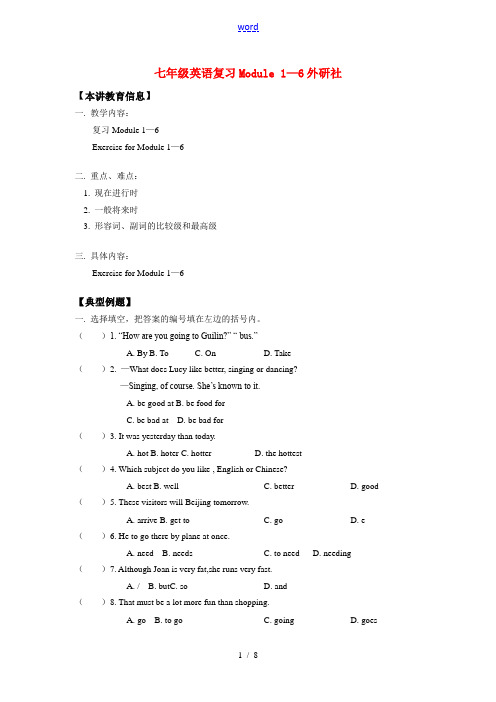
七年级英语复习Module 1—6外研社【本讲教育信息】一. 教学内容:复习Module 1—6Exercise for Module 1—6二. 重点、难点:1. 现在进行时2. 一般将来时3. 形容词、副词的比较级和最高级三. 具体内容:Exercise for Module 1—6【典型例题】一. 选择填空,把答案的编号填在左边的括号内。
()1. “How are you going to Guilin?” “ bus.”A. ByB. ToC. OnD. Take()2. —What does Lucy like better, singing or dancing?—Singing, of course. She’s known to it.A. be good atB. be food forC. be bad atD. be bad for()3. It was yesterday than today.A. hotB. hoterC. hotterD. the hottest()4. Which subject do you like , English or Chinese?A. bestB. wellC. betterD. good ()5. These visitors will Beijing tomorrow.A. arriveB. get toC. goD. e ()6. He to go there by plane at once.A. needB. needsC. to needD. needing()7. Although Joan is very fat,she runs very fast.A. /B. butC. soD. and()8. That must be a lot more fun than shopping.A. goB. to goC. goingD. goes()9. Li Ming wants to be a singer. He thinks it’s an interesting.A. workB. jobC. artD. works()10. Mr. Liu is a man. He is always helping others.A. quietB. kindC. athleticD. funny()11. The boy is very thirsty. Would you him some, please?A. take; breadB. bring; drinkC. get; eggsD. help; cakes()12. “When will Mr. Black e to Beijing?” “ September 5.”A. OnB. ToC. AtD. In()13. “Which is, the sun or the earth?” “Of course, the earth.”A. smallB. smallerC. smallestD. the smallest()14. “Is Tom at school today?” “No. He’s at home he has a bad cold.”A. becauseB. ifC. untilD. before()15. The air in Beijing is getting much now than before.A. cleanB. cleanerC. cleanestD. the cleanest()16. It’s raining .We have to stay at home instead of going out for a piic.A. badlyB. hardlyC. heavilyD. strongly()17. It’s to teach a man how to fish than to give him fish.A. moreB. betterC. goodD. best()18. the afternoon of March 8, the women in the city will have a big party.A. ToB. InC. AtD. On()19. Our teacher is good singing English songs.A. inB. atC. forD. with()20. If it tomorrow, we at home.A. rains; will stayB. will rain; will stayC. rain; stayD. will rain; stay答案:1-5 AACCB 6—10 BACBB 11—15 BABAB 16—20 CBDBA二. 词汇。
外研版七年级下册英语Module1-Module6课文、词组、句子精讲精练复习课件(共137张PPT)
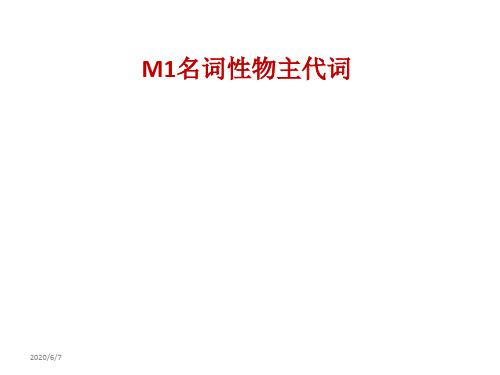
2020/6/7
小试牛刀
1. This is Lingling’s bag. Whose bag is this?
2. These are my books. Whose books are these?
3. This pen is Lucy’s. Whose is this pen?
词
记忆口诀:his,its无变化,my,mine要记牢
This book is mine. = This is my book .
名词性物主代词 = 形容词性物主代词+名词
2020/6/7
巧记口诀:
• 物主代词分两种, • 形容词性名词性, • 形容词性能力差, • 自己不能来当家, • 句子当中做定语, • 身后定把名词加。 • 名词性,独立用, • 主、宾、表语它都行
1) There is/are...
询问失主:
2) Here is/are...
1) Whose... is this/are these/
are they?
2) Is this.../Are these... yo认ur领s?失物: 3) Is it/Are they yours? 1) It's/They're mine/hers.
前面谈论了事物 bag,然后大家才会明白his = his bag
什么时候使用名词性物主代词?
使用名词性物主代词时,必须有特定的语言环境,也就是要 省略的名词大家已经知道或者已经提起过。
There is a book. It’s hers. hers=her book
My bag is green. But his is black. his = his bag
中考英语复习教材一本通: 七下 Unit 1-6(教材全解:教案+学案)
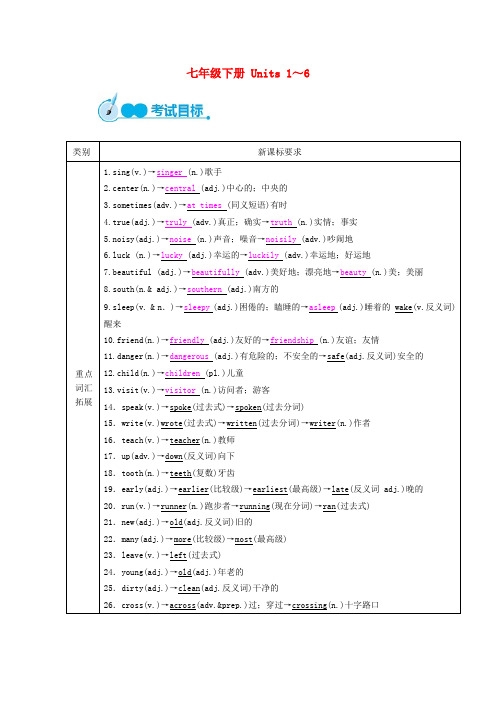
七年级下册 Units 1~6 类别新课标要求重点词汇拓展1.sing(v.)→singer (n.)歌手2.center(n.)→central (adj.)中心的;中央的3.sometimes(adv.)→at times (同义短语)有时4.true(adj.)→truly (adv.)真正;确实→truth (n.)实情;事实5.noisy(adj.)→noise (n.)声音;噪音→noisily (adv.)吵闹地6.luck (n.)→lucky (adj.)幸运的→luckily (adv.)幸运地;好运地7.beautiful (adj.)→beautifully (adv.)美好地;漂亮地→beauty (n.)美;美丽8.south(n.& adj.)→southern (adj.)南方的9.sleep(v. & n.)→sleepy (adj.)困倦的;瞌睡的→asleep (adj.)睡着的 wake(v.反义词) 醒来10.friend(n.)→friendly (adj.)友好的→friendship (n.)友谊;友情11.danger(n.)→dangerous (adj.)有危险的;不安全的→safe(adj.反义词)安全的12.child(n.)→children (pl.)儿童13.visit(v.)→visitor (n.)访问者;游客14.speak(v.)→spoke(过去式)→spoken(过去分词)15.write(v.)wrote(过去式)→written(过去分词)→writer(n.)作者16.teach(v.)→teacher(n.)教师17.up(adv.)→down(反义词)向下18.tooth(n.)→teeth(复数)牙齿19.early(adj.)→earlier(比较级)→earliest(最高级)→late(反义词 adj.)晚的20.run(v.)→runner(n.)跑步者→running(现在分词)→ran(过去式)21.new(adj.)→old(adj.反义词)旧的22.many(adj.)→more(比较级)→most(最高级)23.leave(v.)→left(过去式)24.young(adj.)→old(adj.)年老的25.dirty(adj.)→clean(adj.反义词)干净的26.cross(v.)→across(adv.&prep.)过;穿过→crossing(n.)十字路口—Why do you like them?你为什么喜欢它们?—Because they're kind of cute.因为它们有几分可爱。
【18份】外研版七年级英语下册Module1-6教案(教学设计)
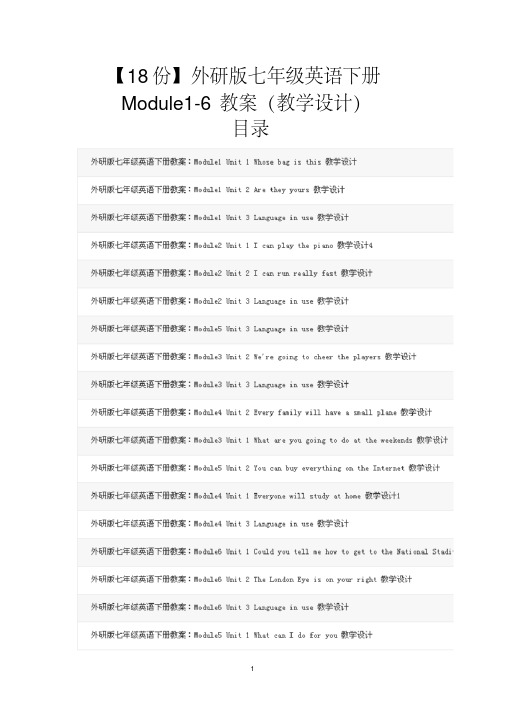
【18份】外研版七年级英语下册Module1-6教案(教学设计)目录(初一下册)教学设计Module One Lost and foundUnit One Whose bag is this?一、教材分析本模块以失物招领为话题,共分三个课时进行。
本模块第一单元的对话是听说课型的新授课,其听说活动都是围绕失物招领这个话题进行,由失物招领这样一个场景引出,学生们在开学返回学校时,惊讶地发现失物招领处的箱子里有很多遗失的物品。
在老师的带领下,学生们一一认领回了自己的失物。
对话通过讲述这样一个故事,轻松地导入了名词性物主代词这一语法项目以及“Whose … is this?”“It?s mine.”“ Is this … yours?”等相关句型。
为第二、三单元的学习不仅提供了话题和语境,同时也为学生们后来的学习扫清语言和文化的障碍。
通过本单元的学习,培养学生助人为乐、拾金不昧的美德,而且还能督促学生爱惜并保管好自己的物品,养成良好的生活习惯。
本单元的重点是名词性物主代词这一语法项目的使用。
难点是在特定语境下正确运用名词性物主代词,使语法知识的学习融入生活实践,培养用语言做事情的能力。
二、教学目标1.语言知识目标(1) 学会词汇:glove, wallet, yours, hers, lose, mine, phone(2) 理解词汇:lost and found box, be careful with, from now on(3) 复习词汇:welcome, crayon, whose, find,2.技能目标(1) 能使用名词性物主代词谈论物品所属、寻找失物主人。
(2) 能通过不同目的的听,迅速提取有用信息。
(3)能听懂,读懂,理解和复述整个对话。
(4) 能完成对话到语篇的信息转换,填写重要信息。
3.学习策略目标(1)借助点读技术,感知、领悟听力技巧和方法;(2)通过用英语与同伴谈论丢失的物品或寻找主人;。
新外研版七年级下(module1-6各题型总复习)(20201126131836)
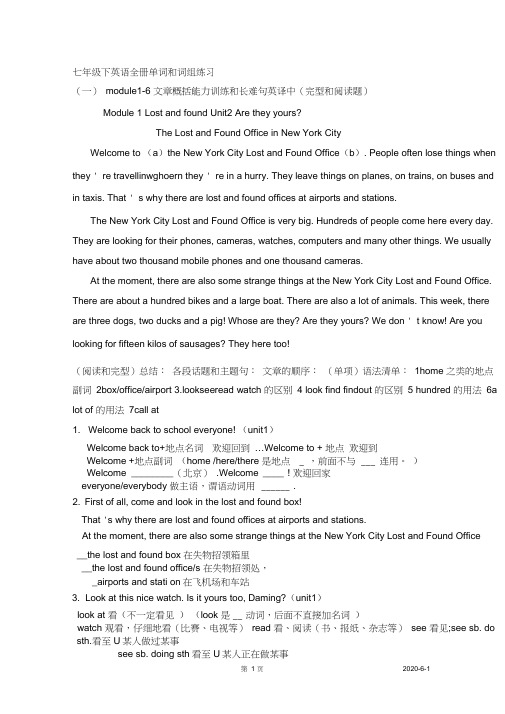
七年级下英语全册单词和词组练习(一)module1-6 文章概括能力训练和长难句英译中(完型和阅读题)Module 1 Lost and found Unit2 Are they yours?The Lost and Found Office in New York CityWelcome to (a)the New York City Lost and Found Office(b). People often lose things when they ' re travellinwghoern they ' re in a hurry. They leave things on planes, on trains, on buses and in taxis. That ' s why there are lost and found offices at airports and stations.The New York City Lost and Found Office is very big. Hundreds of people come here every day. They are looking for their phones, cameras, watches, computers and many other things. We usually have about two thousand mobile phones and one thousand cameras.At the moment, there are also some strange things at the New York City Lost and Found Office. There are about a hundred bikes and a large boat. There are also a lot of animals. This week, there are three dogs, two ducks and a pig! Whose are they? Are they yours? We don ' t know! Are you looking for fifteen kilos of sausages? They here too!(阅读和完型)总结:各段话题和主题句:文章的顺序:(单项)语法清单:1home 之类的地点副词2box/office/airport 3.lookseeread watch 的区别 4 look find findout 的区别 5 hundred 的用法6a lot of 的用法7call at1. Welcome back to school everyone! (unit1)Welcome back to+地点名词欢迎回到…Welcome to + 地点欢迎到Welcome +地点副词(home /here/there 是地点 _ ,前面不与___ 连用。
最新外研版中考英语总复习七年级下册教材全解课件(全册 共108页)
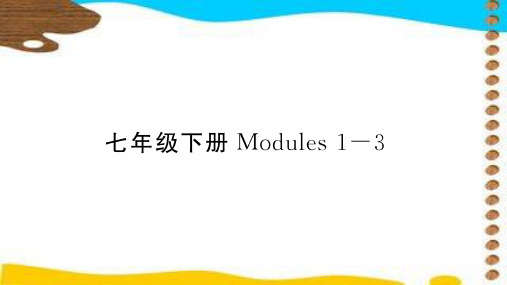
“Couldn't he wait some minutes so that I can ask about my son's state( 状 况 ) ? ” shouted theutes after the doctor left.The nurse answered, tears coming down her face. “ His son died yesterday in a road accident.He was at the burial( 葬礼 ) when we called him for your son's surgery.And now that he saved your son's life, he left running to finish his son's burial.”
一、完形填空(共15小题;每小题1分,满分15分) 阅读下面短文,掌握其大意,然后从每题所给的A、B、C、D 四个选项中选出最佳选项。 In 1980s,I went to Italy for business.One day,I sat with my friend in a wellknown coffee shop in a neighbouring town of Venice,Italy,the city of lights and__1__. ( C )1.A.food B.noodles C.water D.coffee
( C )19.What was the boy's father doing when the doctor arrived? A.He was looking after the boy. B.He was shouting angrily at the nurse. C.He was waiting worriedly. D.Tears were coming down his face.
(完整版)新外研版英语七年级下册m1-6重点总结完整版
七年级下复习资料M1---M6Module 11. whose 疑问代词Whose bag is it? whose为形代Whose is this bag? whose是名代。
2.** 人称代词归纳(必背)主格宾格形物代名物代反身代词我I me my mine myself你you you your yours yourself他he him his his himself她she her her hers herself它it it its its itself我们we us our ours ourselves你们you you your yours yourselves他们they them their theirs themselves3.welcome back to +地点欢迎回到某地Welcome to +地点欢迎到某地来Welcome sb to+地点欢迎某人到某地来4. *everyone 每个人(指人)后面不能接of ,作主语时谓语动词用单数*every one 每个人或物(根据上下文,可指人也可指物)后面可以接of every one of us我们中每个人5. first of all = at first = firstly 首先in the end 最后all the time 一直6. lost and found box失物招领箱7. here’s、here’re句型,其后be的形式由后面的名词决定Here is a book. Here are some books.8. be careful with/of/about sth. 仔细保管某物(反义词careless)*adv.carefully(修饰动词、形容词)9. from now on从现在开始from then on 从那时开始10.I think it's Betty’s. I think+后接肯定句,如果后面是否定句,要否定前移,变为I don’t think11. *watch 观看(vt.电视,电影,比赛等)look 看(vi.表示动作,后接at)see 看见(vt.强调结果)read 看(vt.看书、报纸,杂志等)12. lost and found office失物招领办公室(前面用介词at)13.a pair of gloves一副手套14. look for寻找(强调动作)find找到(强调结果)15.strange adj.奇怪的stranger 陌生人16. get on上(公交车,飞机,轮船,火车等)get off下(公交车,飞机,轮船,火车等)Get in上(小轿车)get out of 下(小轿车)17. lose 动词,丢失(过去式lost,lost也作为形容词,丢失的)be/get lost=lose one’s way 迷路18. travel 旅行注意ing形式:travelling 19.call sb at +号码打....号找某人call Tony at 123456. 20. hundreds of 数以百计的thousands of数以千计的(millions of数以百万计的) three hundred注意:有s必须有of,没有of,后面不能加s21. every day每一天everyday 形容词,日常的22. many other things 许多其他的东西23. at the moment = at this moment此时此刻at that moment在那时24. fifteen kilos of sausages 15公斤香肠25. in a hurry(n.)匆忙的hurry to do sth(v.)=do sth in a hurry匆忙做某事hurry up(v.)=be quick 赶快26. that’s why + 从句那就是为什么….27. help sb (to)do sth 帮助某人做某事help sb with sth在…方面帮助某人28. think about 考虑think of想起,想出think over仔细考虑29.What’s the name of.....?=What’s......called?.....的名字是什么?Module 21. the new clubs for this term这个学期的俱乐部,注意此处用for,而不是of2. on the board 在布告板上3. would like+名词想要某物I would like a cup of coffee。
新外研版七年级下册知识点整理M1-6剖析
MODULE 1 Lost and Found1. lost and found box 失物招领箱2. welcome back 欢迎回来3.first of all 首先4. here is/are... 这有...5. from now on 从现在开始6. be careful with 小心保管7. whose bag 谁的包8. talk to sb. 与某人交谈9. mobile phone 移动电话,手机10. get on 上车( get off 下车)11. two thousand 两千(thousands of 数以千计的...)12. look for 寻找13. at the moment 现在14. in a hurry 匆忙地15. alot of 许多,大量16. hundreds of 数以百计的17. on the train 在火车上18. every day 每天19. such as 例如20. make a list of 列一张...的清单21. ask/answer questions 问/回答问题重点句子:1.Welcome back to school! 欢迎回到学校。
2.Whose bag is this 这是谁的书包?3.It’s mine.它是我的。
4.Are these crayons yours这些是你的蜡笔吗?5. Whose tapes are these 这些是谁的磁带?6. Here’s a purple wallet!这儿有个紫色钱包。
7. I think it’s Betty’s. Lingling. 我认为它是玲玲的。
8. Everyone, please be careful with your things from now on.请大家从今以后仔细对待你们的东西。
9. People often lose things when they’re travelling or when they’re in a hurry.当人们旅行或在匆忙中时,他们经常丢东西。
七年级下册外研社m1知识点
七年级下册外研社m1知识点一、语法知识点1. 动词be的用法动词be是英语中最基础、最常见的动词之一,其主要用法如下:(1)表示存在,例如:There is a cat in the room.(屋子里有一只猫。
)(2)表示状态,例如:She is tired.(她累了。
)(3)表示身份、职业等,例如:He is a teacher.(他是一名教师。
)2. 一般现在时的构成及用法一般现在时表示经常性或普遍性的动作或状态。
其构成为:主语+动词原形。
例如:She likes swimming.(她喜欢游泳。
)3. 祈使句的构成及用法祈使句是表示请求、命令、建议等意义的句子。
其构成为:动词原形+其他。
祈使句的主语一般省略。
例如:Eat your breakfast.(吃早餐。
)二、词汇知识点1. 蔬菜类单词蔬菜类单词是日常生活中常用的词汇之一,常见的蔬菜有:carrot(胡萝卜)、cucumber(黄瓜)、tomato(西红柿)、lettuce (生菜)等。
例如:I like eating carrots.(我喜欢吃胡萝卜。
)2. 数字类单词数字类单词也是日常生活中常用的词汇之一。
常见的数字有:one(1)、two(2)、three(3)、four(4)等。
例如:I have three apples.(我有三个苹果。
)三、阅读技巧知识点1. 阅读理解阅读理解是英语考试中常见的题型,要求考生在一定时间内阅读短文并回答相关问题。
建议考生在练习时注意以下几点:(1)首先浏览全文,把握大意;(2)遇到不懂的单词可尝试猜测意思;(3)仔细阅读问题,确定问题类型及所需信息;(4)找到对应的句子段落进行答题。
2. 选词填空选词填空是一种练习词汇运用能力的题型。
在做这类题型时,建议考生注意以下几点:(1)认真阅读每个空后的提示及选项;(2)分析每个选项的含义及语法用法;(3)结合整个句子的含义和语法规则进行填空。
以上为七年级下册外研社M1的知识点简介,希望能对同学们的学习有所帮助。
外研社七下英语M1至M6知识点总结
七年级下册知识点总结Module 11、lost and found 失物招领 in the lost and found box at the lost and found office2、welcome back to 欢迎回... welcome to +表示地点的名词欢迎来某地 welcome home 欢迎回家 You are welcome. 不用谢。
3、first of all 首先 at first firstly4、there be 句型中谓语动词采用就近原则5、a lot of =lots of 许多既可以修饰可数名词,也可以修饰不可数名词。
6、look at 看(不一定看见)look 不及物动词,后面不直接加名词 see 看见watch 观看,仔细地看(比赛、电视等)read 看(书、报纸、杂志等)7、everyone/everybody 做主语,谓语动词用单数 8、be careful with 注意.../小心... 9、from now on 从现在开始 from then on 从那时开始10、talk to sb 和某人说话(侧重主动说)talk with sb 和某人说话(侧重两人都说) talk about sth 谈论某事 say 说,强调说的内容speak 说,后面可以直接接语言 speak English/Chinese speak to sb 和某人说话 tell sb sth=tell sth to sb告诉某人某事11、look for 寻找(不一定找到) find (偶然地)找到 find out 查明,找到(经过努力) search 搜索,调查look over检查 look after =take care of 照顾 look forward to 期盼,期待12、get on the bus 上公交车 get off the bus 下公交车 13、in a hurry 匆忙地 hurry up=come on 快点儿 hurry to do sth 匆忙做某事14、hundreds of 成百的(大约数加s,加of) two hundred (具体数不加s,不加of)同样用法还有thousand、 million、billion15、every day 每天 everyday 每天的(形容词,后面接名词)16、at the moment=at this moment=now 此时此刻,现在 at that moment=then 在那时17、such as 例如,后面不加逗号 for example 例如,后面加逗号18、帮助某人做某事 help sb (to)do sth help sb with sth19、--whose ... is this 这是谁的... --It’s+名词性物主代词. 20、Are these ...+名词性物主代词这些...是某人吗语法:人称代词与物主代词数人称代词物主代词主格宾格形容性物主代词名词性物主代词单数第一人称我 I me my(我的) mine(我的)单数第二人称你 you you your yours单数第三人称他 he him his his单数第三人称她 she her her hers单数第三人称它 it it its its复数第一人称我们 we us our ours复数第二人称你们 you you your yours复数第三人称他/她/它们 they them their theirsModule 21、play后接乐器时,乐器名词前要加the,接球类、棋类名词时,不加the。
- 1、下载文档前请自行甄别文档内容的完整性,平台不提供额外的编辑、内容补充、找答案等附加服务。
- 2、"仅部分预览"的文档,不可在线预览部分如存在完整性等问题,可反馈申请退款(可完整预览的文档不适用该条件!)。
- 3、如文档侵犯您的权益,请联系客服反馈,我们会尽快为您处理(人工客服工作时间:9:00-18:30)。
M1 U1 根据汉意完成句子
1.她想给我两副手套。
(P7)
She wants to give me ______ _______ _______ ____________.
2.欢迎来我们学校。
___________ ___________our school.
3.所有的人都在这里。
Everyone _____________here.
4.首先,你得帮助那位老人。
____________ ________ ___________, you should help
the old man.
5.小心保管你的钱包。
______________ ______________ ___________your wallet.
6.有一些苹果和一个梨在那个盒子里。
There __________some apples and a pear in
the box.
句型转换
1.This is my football. (改为一般疑问句并做肯定回答和否定回答)
___________ ____________ ___________ football?
Yes, ___________ ___________
No, ___________ ___________
2.The crayons are Mary’s. (对划线部分提问)
___________are the crayons?
3.I think you are right. (改为否定句)
___________ ___________ ___________ you ___________right.
4.Thank you very much. (写出答语)
___________ ___________ ___________
M1U2 根据句意用首字母或汉语提示完成句子。
(p9)
1.The old man gave away eight _________(百)books to the primary school in the
countryside.
2.Each year, t_________of visitors come to Huai’an to enjoy Heziyang food.
3.May I use your c_________, Danny? I want to take some photos.
4.My school is far from my home, So I take a t_________to school every day.
5.W_________do you like math? –Because I think it’s very interesting.
6.Tom isn’t good at English. He passed the English exam yesterday. You can imagine
(想象)how s_________it is!
7.Don’t l_________your things on the train.
根据汉意完成句子
1.她买了两千克西红柿。
She bought _________ _________ _________ _________. 2.这本书没有趣,给我另外一本书好吗?
This book isn’t interesting. Could you give me _________ _________?
3.那里还有许多别的自行车。
There are _________ _________ _________over there.
用所给词的适当形式填空‘(P17)
1.Jim’s ruler is long, but _________(I) is short.
2.________(you) jacket is very good.
3.It is a bird. _______________(it) name is Polly.
4.That is _____________(she) wallet.
5.My watch is red. ___________(you ) is yellow.
用所给词的适当形式填空(P20)
1.Lin Yun’s bag is in the ___________(lose) and ___________(find)box.
2.Please be __________(care) with your things!
3.Is this __________(you) pen? Yes, it’s ____________(I).
4.______________(who) pen is this?
5.Whose ____________(glove) are these?
6.Here ____________(be) a white wallet.
7.I think this nice watch is _____________(Betty).
8.People often lose things when they are ____________(travel)
根据汉语提示完成句子。
st month, I donated two ___________(百) yuan to the people in Ya’an.
10.There are many ______________(动物) on the farm.
11.A man is _____________(谈话) to a woman at the lost and found office.
12.An old lady is ________ ___________(上车) the bus.
13.Call Marry ___________83765490
14.People ___________a hurry often lose things.
15.Think _________ three or four things you have lost or you can choose from the list.。
